- Home
- Jane Smiley
The Greenlanders Page 4
The Greenlanders Read online
Page 4
Once the journey had been decided on, Thorleif regained his good humor, saying to Ivar Bardarson that a journey to Markland would last him even more years in the telling than a journey to Greenland. It was well known that the forests of Markland were rich in sable, black bear, marten, and other desirable furs, and Thorleif looked forward to making his fortune. The ship had been readied to return to Norway, and so the journey was quickly begun. Many boats accompanied it to Herjolfsnes, and many pairs of eyes watched the red and white sails disappear under the horizon. The Greenlanders who went along included Hauk Gunnarsson, Odd, the brother of Thord of Siglufjord, Osmund Thordarson, who had been to Markland once before, Ketil Erlendsson, and his son Erlend. But it may be fairly said that all the Greenlanders were tempted to go, for every Greenlander knows of the famous adventures of Leif Eriksson and his kin, and of the paradise to be found in the west.
One day toward the middle of summer, when the ship had been gone for a little time, a servingwoman came from Ketils Stead to Gunnars Stead, seeking Ingrid, with word that Sigrun Ketilsdottir had come to her confinement, and that the women of the farm were unable to bring on the birth. She went off with them in spite of the ill feeling between the two farmsteads, and Margret went with her.
Ketils Stead was a large farm with a number of advantages. Austfjord lapped at the foot of the homefield and there was excellent fishing right outside the farmhouse. The homefield, though, had a northerly slope, and was late, every year, to turn green. Ketil’s horses were seaweed eaters, which, Asgeir said, made them hard to handle. Ketils Stead was within sight of another farm, which belonged to the church at Undir Hofdi. For this reason, Ketil tended to look to Gunnars Stead when he coveted more land, or so Asgeir often said.
Sigrun Ketilsdottir was white, and except for her large belly, as bony as a cow at the end of winter. She lay with her eyes closed between the pains, and each pain seemed to wring her out. The women sat about her. Ingrid went up and took her hand and said, “My Sigrun, it seems to me that the child will be a big one, for it has been eating you up from the inside. But it will sleep well and thrive, once it is born.” Sigrun nodded and was taken with another pain. Behind her, Margret heard one of the farm women mutter, “She has been seized by ghosts, no matter what folk say about sleeping and thriving.” And another woman said, “This child here has more flesh on her bones.”
It seemed to Margret that Sigrun’s belly lay over her like a whale, smothering her, for no matter how the women pulled her up, or propped her, Sigrun sank down without strength beneath the weight. The first pains had come at evening meat, two nights before, and the waters shortly after that. Margret gleaned from the farm women’s whispered conversation that they had little hope for either mother or child.
But Ingrid had a good reputation in the district for delivering at difficult births, and she went about her business in the usual fashion. She smoothed the coverlet and untangled Sigrun’s gown, made sure there were no knots in her clothes. The door and the window to the steading were open, and the women walked in and out with their spinning. Sometimes Ingrid offered the laboring girl a warm drink of ground dulse mixed with some other herbs. She slipped a small knife under the straw of the bedcloset, to cut the pains. The afternoon went on, and toward suppertime, Ingrid reached into Sigrun and felt the baby’s head with the tips of three of her fingers. The servingwomen ran to get a clean sheepskin for catching the baby, and Ingrid sent for Nikolaus the Priest from Undir Hofdi. Sigrun had ceased screaming, although anyone could see the contractions under her gown. But they seemed not to be a part of the woman in the bedcloset, whose eyes were almost closed, and who let the warm hearty seaweed mixture dribble out of the corners of her mouth nearly as fast as the servingwoman could pour it in. All the women were full of sighs now. Night fell, and Nikolaus the old priest came after his evening meat and stood beside the bedcloset and prayed in a way that told everyone the outcome.
The women held Sigrun up by the shoulders and the back to ease the passage of the baby, and she was utterly without strength. The baby was born, caught on the sheepskin, and wrapped quickly in a length of fine wadmal. It was not large at all, and it frightened Margret to look at it, with its slanting eyes and black hair growing all down its back. After it was born, Sigrun began to pour forth bright red blood, drenching her shift and the straw of the bedcloset, and then she was dead.
The child was taken to Vigdis, one of the farm women who had given birth to a child in the late winter, and put to the breast, but Vigdis said that it didn’t know how to suck, and finally the women had to drip ewe’s milk into its little mouth through the shaft of an eagle’s quill. Nikolaus the Priest christened the baby Ketil and agreed that it would die.
But the child did not die, as it happened, and Vigdis succeeded in feeding it full of rich ewe’s milk. Not only that, it passed two large black stools, and in all ways began to look more like any other child. Vigdis and her own baby, Thordis, who was fat and cheerful, moved into the steading with the new one. Now it was reported that for three nights running, the ghost of Sigrun walked about the farmstead and came inside to seize the baby. And so Vigdis placed her own Thordis in the cradle, and when Sigrun laid hands upon her, Thordis screamed lustily, and Vigdis leapt from her bed and wrestled the ghost to the ground, saying, “Sigrun, your child has been baptized in the name of Christ, and must live.” After this, Sigrun’s ghost departed from Ketils Stead, and Vigdis was widely praised for her resourcefulness.
In Markland, meanwhile, the travelers were commending themselves on how well their journey had gone—fair winds, excellent hunting, and much timber to be found in those dark, dense forests, and the only signs of skraelings were at least a year old. Each night, the sailors sat about the fire they had made, and the Greenlanders sat about the fire they had made, but these fires were not so far apart that the two parties could not speak in a friendly way to one another, nor reply to observations the other party might make. Men’s trenchers were so full of roast meat that they could not eat it all, and all were content.
One night, Thorleif asked what manner of beings these skraelings were, and Osmund Thordarson, the only man who had traveled to Markland before, replied that he had never seen skraelings in Markland, himself, but the tales of them were that they were large and fierce. Early expeditions to the Markland coast had seen much fighting. Surely Thorleif had heard of Karlsefni’s famous voyage, when men had hoped to settle in Markland and build farms there? Thorleif had not. The short of it was that Karlsefni found the land rich and mild—the cattle stayed out in the fields all winter, for one thing, as there was no snow—but in the spring skraelings came in fleets of canoes, waving staves that made a great whistling noise, and they came with many, many skins, anxious to trade, especially for red cloths, and as always with skraelings, the Norsemen could cut the cloth into smaller and smaller pieces, but the skraelings would trade as much for the small as for the large. And then Karlsefni’s bull came out of the woods and bellowed, and the skraelings ran off in terror.
The Norsemen laughed at the ignorance of these demons, but, Osmund said, they were not laughing so heartily when the skraelings returned three days later, and in greater numbers—numbers so great that the water was black with their boats, and this time they were waving their staves in the other direction, and they stormed upon the land and attacked, and they had so many and such strange weapons, and they knew so well how to use them, that the Norsemen took to their heels this time, and, Osmund reminded Thorleif, this was in early days, when iron wasn’t so scarce, and all men carried axes and swords and shields, as well.
There was with the party a woman named Freydis, who was the daughter of Erik the Red and the sister of Leif the Lucky, and she had been resting in her booth. When she heard the commotion, it was said, she came out of the booth and shouted her contempt after the fleeing Norsemen, but they did not turn to aid her, so she made her way after them, though she was with child and feeling poorly. The skraelings pursued her. But the fact was
that she happened upon the corpus of one of the Norsemen, and she grabbed the sword from his hand and turned. The skraelings were nearly upon her, but she pulled the front of her gown back from her breasts, and beat the flat of the sword upon her chest, yelling all the while, and the skraelings were frightened by this display, and fled.
Thorleif found this tale very diverting.
“The case is,” said Osmund, “that Greenlanders have been back and forth to Markland time and again since then, and the skraelings in Markland have always been just as numerous and unpredictable as they were in the beginning, and the Greenlanders have been steadily less numerous and less well armed, so it is not a land that Greenlanders feel at home in, though it is a more welcoming land than their home.”
Now Hauk Gunnarsson spoke up, and said that the skraelings in the waste parts of Greenland were not so fierce nor so strange as these Markland skraelings, and by this time it was late, and so the party of travelers rolled up in their furs and slept.
The next night, Osmund Thordarson spoke up again, and said, “Indeed, Markland is rich enough, though dark withal. And we have found what we sought here.”
The men greeted this remark with silence.
Osmund went on. “But few folk have seen such a land as Vinland, which lies to the south.”
“Even so,” said Thorleif, “I can see far enough. Small islands, narrow straits, and upthrusting rocks make for bad sailing.”
The men continued silent, sleepy with their meat.
Now Erlend Ketilsson sat up and leaned forward in the firelight. “It seems to me that this Norwegian has come by a great deal of praise in this past year. What a fine man, what a fine ship, what a lot of goods he has brought us.” He fell silent, and some of the Greenlanders set their bowls beside them on the sand. “Mostly, though, folk chatter about what a fine sailor the fellow is, how he might sail through the eye of a Nuremburg needle if he wished. Now this Thorleif sits back and eats up this praise like sourmilk with berries in it.”
There was a long pause, when all of the men, Norwegians and Greenlanders alike, were silent, and the silence was filled with the dark sounds of the great Markland forest, and then Thorleif laughed in his usual way, but loudly, and so suddenly that men started in their places. But he made no reply to Erlend, and shortly men went to their rest.
In the morning, Thorleif said, “If this place called Vinland is so rich, it may be that such poor folk as ourselves will want to trade it for Bergen, where many Germans are getting themselves in, or Gardar, even, though Gardar is said by the Greenlanders to be next door to Paradise. But we cannot make this trade until we see the famous spot, can we?”
“It seems to me,” said Odd of Siglufjord, “that we would do well to finish our work here and return to Gardar. Only yesterday we considered ourselves rich men, for all the furs and timber we have gotten. And these tales of the skraelings do not make me want to encounter them.”
Thorleif looked at Hauk Gunnarsson, but Hauk said nothing, so Thorleif said, “This morning we are poor men again. We are like folk who have gobbled up a lot of rich meat and then hear that a better feast is laid elsewhere.”
Osmund pressed them. “We have seen no signs of skraelings in this district, and though men have died seeking Vinland, what sort of men are we if we don’t take a look? It is said that the waving grass is as high as a man’s waist, and wild grapes are only the best of all the berries to be found there. The cove is full of swimming fish and shellfish of all kinds, and the reindeer herds take days to move past. And all the sorts of timber needed for building a ship grow together in one place.”
Erlend said, “Leif the Lucky found himself the Garden of Eden, and that’s a fact.”
But Odd said, “No priest has ever been to Vinland itself, only to Markland, and so it is not easy to know about the Garden of Eden.”
Now Thorleif looked at Hauk again, and Hauk looked at him, and said, “I would like to see it.”
So they stacked the piles of timber and buried the furs against scavengers and set out, and for the first day, the sailing was easy and swift. On the second day, however, a storm blew up so suddenly that they had no time to put in among the treacherous islets and chains of rocks, and they were caught. The storm lasted well into the night, the ship was thrown against many rocks, and its planking was dented and cracked. The mast came down, and Ketil Erlendsson and a sailor, Lavrans with the black beard, were killed outright. The lookout was thrown into the sea and drowned, and another sailor was thrown by a wave against the side of the ship with such force that his arm was shattered.
After this misadventure, there was no peace within the group. The lookout had been a sharp-sighted and well-liked man, and Lavrans was related to some of the other sailors. They were not pleased with his death. Ketil, the sailors said, had gotten his deserts for instigating this ill-omened trip to Markland, and for having raised such a flirtatious daughter in the first place. Erlend, they said, was a troublemaker, and it was like the Greenlanders to be influenced by such a person. Thorleif did not put a stop to these arguments, but for himself, he only said, “I am not the first man to seek good fortune and find ill.”
The land was well wooded, and materials for repairs were not far to seek. While the sailors went about this business, the Greenlanders lashed together a large vat, filled it with water, dismembered the corpuses, and set to boiling the flesh off the bones so that they could be carried back to Gardar and buried in consecrated ground. Two sailors explored the shore, but the body of the drowned man did not appear, so one of the Greenlanders carved him a runestick, and put this in the sack with the others’ bones for burial at the church. By the time the ship was repaired, the Greenlanders and the sailors had little to say to one another.
Thorleif sailed north along the coast, putting in from time to time to look for game or fish, but everything seemed to have vanished, as if by some curse. When, after six days, they found the timber and furs they had gathered, these treasures now seemed somehow of little worth and yet cumbersome. Hauk and a few men went snaring game in this spot, but had no luck. After some debate, because of the lateness of the year, the ship set out with few provisions, only some fresh water and a bit of dried meat. The sailors taunted the Greenlanders, saying, “Tell us your tales, now.” But the only tales the Greenlanders knew were of ships that had missed Greenland entirely and found themselves in Iceland, or, worse, Ireland, after weeks of drifting. Had not Thorvald, a mighty Viking hero who sailed with Karlsefni on his famous voyage, been swept to Ireland and enslaved there?
After three days of slow and careful sailing, Thorleif brought them to Bear Island for the night, and here a fight broke out between two of the sailors and two of the Greenlanders, a man from Herjolfsnes and Erlend Ketilsson. Erlend lost two teeth. Osmund tried to prevail on Thorleif to stop the fight, but Thorleif said, “A stopped fight must start again, when men are angrier. If they break each other’s bones now, they must kill each other later.” In the morning, the travelers awoke, hungry again, to discover that Hauk Gunnarsson had disappeared.
Of all the people on the voyage, Hauk Gunnarsson was friendly only toward Odd from Siglufjord, whom he had known from boyhood. The others he rarely spoke to or even looked at, and the Greenlanders, familiar with Hauk Gunnarsson’s ways, did not take this amiss. The sailors, however, spoke ill of Hauk, and accused him of being haughty. One man, especially, named Koll, whose temper was inflamed by the death of his cousin Lavrans, seemed to take great pleasure in baiting Hauk at mealtimes and times of rest. The humor of this fellow Koll was not improved by the diminishing food stocks, but Thorleif exerted no restraint, for that was not his way. Now Koll began suggesting that they would not soon get another wind as good as the one then blowing, and they had better set forth, for obviously, Hauk Gunnarsson had been swept away, or lured away by trolls. The Greenlanders scoffed at this, and replied that Hauk was no doubt hunting.
And, indeed, Hauk Gunnarsson had seen a wealth of birds flying around the cliffs of t
he island, and had set out to snare some, the work of a morning, but once he was away from the ship, he saw many signs of bears. The tale of his hunting trip is a famous one, for after men ceased going to the Northsetur, the hunting of bears grew rare in Greenland, and few men knew how to come upon them, lure them into the water, and kill them as they were swimming, for unlike the skraelings, the Greenlanders were not adept with skin boats, and did not especially enjoy ice hunting, or sea hunting. Hauk Gunnarsson was crouched down, setting a snare for a bird when he smelled the odor of bear, and then a small she-bear and her single cub came over the cliff near where he was hidden in a cleft. As he stood still, the bear came closer, neither smelling nor seeing him, and he silently removed a loop of walrus hide from his belt, tossed it over the bear’s head, and quickly wrapped it around a protruding rock, jerking the bear’s head backward. Then he quickly grabbed his short spear and drove it down into the bear’s breast, and so quickly did all of this happen that the she-bear made no noise and the cub, foraging farther down the cliffside, did not even look around. After that, Hauk waited behind the she-bear for the cub to return, and when it did, Hauk took the loop of walrus hide, and dropped it over the neck of the cub, as with a dog. The other end he tied to the paw of the she-bear, and then the cub followed along when Hauk dragged the she-bear back to the landing spot, where it was nearly nightfall, and the Greenlanders and the sailors were disputing about whether to sail or not.
The sight of the bear, and the prospect of roast meat, quieted all voices. The cub Hauk gave to Thorleif, who poured the water out of his largest cask and put the bear cub in it. And that is how it happened that one last tamed bear cub came to Bergen, and ended eventually in the Castle of Mehun-sur-Yevre, for the Duke of Berry was a collector of wild animals, and this bear, it is said, lived for many years, and died long after Hauk Gunnarsson himself.

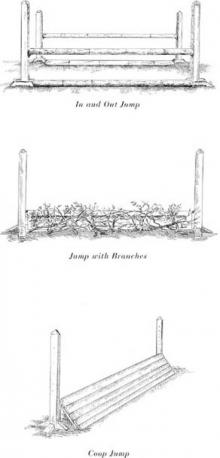 The Georges and the Jewels
The Georges and the Jewels Pie in the Sky: Book Four of the Horses of Oak Valley Ranch
Pie in the Sky: Book Four of the Horses of Oak Valley Ranch Duplicate Keys
Duplicate Keys Charles Dickens
Charles Dickens Good Faith
Good Faith Private Life
Private Life A Thousand Acres: A Novel
A Thousand Acres: A Novel The Greenlanders
The Greenlanders Ten Days in the Hills
Ten Days in the Hills Gee Whiz: Book Five of the Horses of Oak Valley Ranch
Gee Whiz: Book Five of the Horses of Oak Valley Ranch A Thousand Acres
A Thousand Acres The All-True Travels and Adventures of Lidie Newton
The All-True Travels and Adventures of Lidie Newton Ordinary Love and Good Will
Ordinary Love and Good Will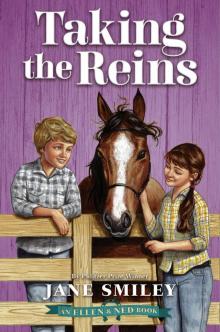 Taking the Reins (An Ellen & Ned Book)
Taking the Reins (An Ellen & Ned Book) The Man Who Invented the Computer
The Man Who Invented the Computer Horse Heaven
Horse Heaven The Age of Grief
The Age of Grief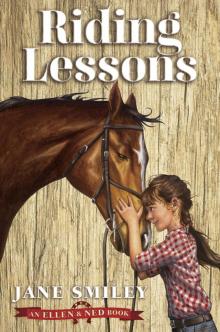 Riding Lessons
Riding Lessons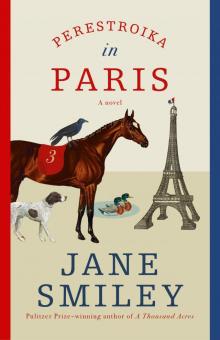 Perestroika in Paris
Perestroika in Paris A Good Horse: Book Two of the Horses of Oak Valley Ranch
A Good Horse: Book Two of the Horses of Oak Valley Ranch Saddles & Secrets (An Ellen & Ned Book)
Saddles & Secrets (An Ellen & Ned Book) Some Luck: A Novel
Some Luck: A Novel Champion Horse
Champion Horse Some Luck
Some Luck Gee Whiz
Gee Whiz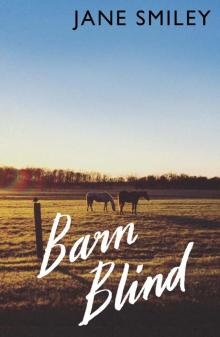 Barn Blind
Barn Blind A Thousand Acres (1992 Pulitzer Prize)
A Thousand Acres (1992 Pulitzer Prize) Pie in the Sky
Pie in the Sky True Blue
True Blue A Thousand Acres_A Novel
A Thousand Acres_A Novel A Good Horse
A Good Horse